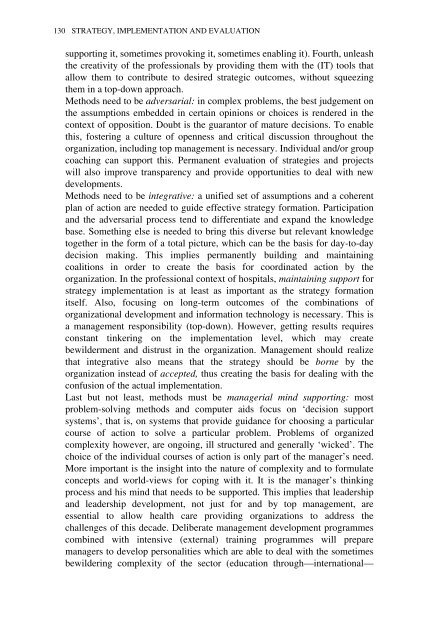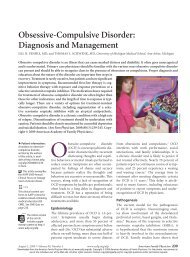Health Information Management: Integrating Information Technology ...
Health Information Management: Integrating Information Technology ...
Health Information Management: Integrating Information Technology ...
Create successful ePaper yourself
Turn your PDF publications into a flip-book with our unique Google optimized e-Paper software.
130 STRATEGY, IMPLEMENTATION AND EVALUATION<br />
■<br />
■<br />
■<br />
supporting it, sometimes provoking it, sometimes enabling it). Fourth, unleash<br />
the creativity of the professionals by providing them with the (IT) tools that<br />
allow them to contribute to desired strategic outcomes, without squeezing<br />
them in a top-down approach.<br />
Methods need to be adversarial: in complex problems, the best judgement on<br />
the assumptions embedded in certain opinions or choices is rendered in the<br />
context of opposition. Doubt is the guarantor of mature decisions. To enable<br />
this, fostering a culture of openness and critical discussion throughout the<br />
organization, including top management is necessary. Individual and/or group<br />
coaching can support this. Permanent evaluation of strategies and projects<br />
will also improve transparency and provide opportunities to deal with new<br />
developments.<br />
Methods need to be integrative: a unified set of assumptions and a coherent<br />
plan of action are needed to guide effective strategy formation. Participation<br />
and the adversarial process tend to differentiate and expand the knowledge<br />
base. Something else is needed to bring this diverse but relevant knowledge<br />
together in the form of a total picture, which can be the basis for day-to-day<br />
decision making. This implies permanently building and maintaining<br />
coalitions in order to create the basis for coordinated action by the<br />
organization. In the professional context of hospitals, maintaining support for<br />
strategy implementation is at least as important as the strategy formation<br />
itself. Also, focusing on long-term outcomes of the combinations of<br />
organizational development and information technology is necessary. This is<br />
a management responsibility (top-down). However, getting results requires<br />
constant tinkering on the implementation level, which may create<br />
bewilderment and distrust in the organization. <strong>Management</strong> should realize<br />
that integrative also means that the strategy should be borne by the<br />
organization instead of accepted, thus creating the basis for dealing with the<br />
confusion of the actual implementation.<br />
Last but not least, methods must be managerial mind supporting: most<br />
problem-solving methods and computer aids focus on ‘decision support<br />
systems’, that is, on systems that provide guidance for choosing a particular<br />
course of action to solve a particular problem. Problems of organized<br />
complexity however, are ongoing, ill structured and generally ‘wicked’. The<br />
choice of the individual courses of action is only part of the manager’s need.<br />
More important is the insight into the nature of complexity and to formulate<br />
concepts and world-views for coping with it. It is the manager’s thinking<br />
process and his mind that needs to be supported. This implies that leadership<br />
and leadership development, not just for and by top management, are<br />
essential to allow health care providing organizations to address the<br />
challenges of this decade. Deliberate management development programmes<br />
combined with intensive (external) training programmes will prepare<br />
managers to develop personalities which are able to deal with the sometimes<br />
bewildering complexity of the sector (education through—international—











